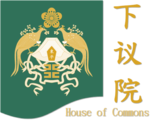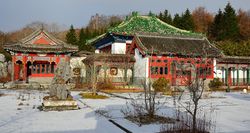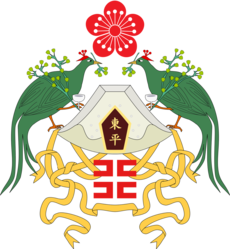Dong Ping House of Commons
Dong Ping House of Commons 东平下议院 Tungp'ing Hsia-i-yuan | |
|---|---|
| 1st Parliament | |
 | |
| Type | |
| Type | |
| History | |
| Founded | 15 June 2015 |
| Leadership | |
Speaker of the House of Commons | |
| Structure | |
| Seats | 19 |
 | |
Political groups | Government • Conservative Party Opposition • Labour Party • Green Party • Speaker |
| Meeting place | |
 Parliament House, Tienhua | |
The Dong Ping House of Commons and the President jointly make up the legislature of Dong Ping, which is based on the Westminster system. It has 19 members, elected for a five-year term in multi-seat constituencies. The House of Commons is unicameral and is made up of Members of Parliament (MPs) who are elected, as well as Non-constituency Members of Parliament (NCMPs) and Nominated Members of Parliament (NMPs) who are appointed.
The Speaker of the House of Commons has overall charge of the administration of the House of Commons and its secretariat, and presides over parliamentary sittings. The Leader of the House is an MP appointed by the Prime Minister to arrange government business and the legislative programme of the House of Commons, while the unofficial Leader of the Opposition is the MP who leads the largest opposition party able and prepared to assume office if the Government resigns. Some of the House of Common's work is carried out by select committees made up of small numbers of MPs. Standing Select Committees are permanently constituted to fulfil certain duties, and ad hoc Select Committees are established from time to time to deal with matters such studying the details of bills.
The main functions of the House of Commons are lawmaking, controlling the nation's finances, and ensuring ministerial accountability. The House of Commons convenes when it is in session. The first session of a particular House of Commons commences when the House of Commons meets after being formed following a general election. A session ends when the House of Commons is prorogued (temporarily suspended) or dissolved. The maximum term of each House of Commons is five years, after which the House of Commons automatically dissolves. A general election must then be held within three months.
The quorum for a Parliamentary sitting is one quarter of the total number of MPs, not including the Speaker. An MP begins a debate by moving a motion and delivering an opening speech explaining the reasons for the motion. The Speaker then puts the motion in the form of a question, following which other MPs may debate the motion. After that, the mover may exercise a right of reply. When the debate is closed, the Speaker puts the question on the motion to the House and calls for a vote. Voting is generally done verbally, and whether the motion is carried depends on the Speaker's personal assessment of whether more MPs have voted for than against the motion. MPs' votes are only formally counted if an MP claims a division.
The House of Commons regulates its own privileges, immunities and powers. For instance, the freedom of speech and debate and proceedings in the House of Commons may not be impeached or questioned in any court or other place out of the House of Commons. The House of Commons may punish an MP for acting dishonourably, abusing a privilege or behaving contemptuously.
Composition
Members of Parliament
The House of Commons is unicameral – all Members of Parliament (MPs) make up a single chamber, and there is no senate or upper house. Ten are elected by the people while up to four Non-constituency Members of Parliament (NCMPs) and up to four Nominated Members of Parliament (NMPs) may be appointed.
Participation in Parliament
NCMPs and NMPs can participate in all Parliamentary debates, but cannot vote on any motion relating to:
- bills to amend the Constitution;
- Supply Bills, Supplementary Supply Bills or Final Supply Bills, which authorise the spending of public funds by the Government;
- Money Bills, which deal with various finance-related matters;
- votes of no confidence in the Government; and
- removal of the President from office.
Qualifications
Persons are qualified to be elected or appointed as Members of Parliament if:
- they are Dong Pingese citizens;
- they are 18 years of age or above on the day of nomination for election;
- their names appear in a current register of electors;
- they are able, with a degree of proficiency sufficient to enable them to take an active part in Parliamentary proceedings, to speak and, unless incapacitated by blindness or some other physical cause, to read and write at least one of the following languages: Mandarin, Japanese or English; and
- they are not otherwise disqualified from being MPs under the Constitution.
The constitution provides that persons are not qualified to be MPs if:
- they are and have been found or declared to be of unsound mind;
- they are undischarged bankrupts;
- they hold offices of profit;
- having been nominated for election to Parliament or the office of President or having acted as election agent to a person so nominated, they have failed to lodge any return of election expenses required by law within the time and in the manner required;
- they have been convicted of an offence by a court of law in Dong Ping or Japan and sentenced to imprisonment for a term of not less than one year or to a fine of not less than 2,000 huans and have not received a free pardon; or
- they are disqualified under any law relating to offences in connection with elections to the House of Commons or the office of President by reason of having been convicted of such an offence or having in proceedings relating to such an election been proved guilty of an act constituting such an offence.
A person's disqualification for having failed to properly lodge a return of election expenses or having been convicted of an offence may be removed by the President. If the President has not done so, the disqualification ceases at the end of five years from the date when the return was required to be lodged or, as the case may be, the date when the person convicted was released from custody or the date when the fine was imposed.
Speaker of Parliament
The Speaker has overall charge of the administration of the House of Commons and its secretariat. His or her official role is to preside over parliamentary sittings, moderating debates and making decisions based on the Standing Orders of Parliament for the proper conduct of parliamentary business. The Speaker does not participate in debates, but can abstain or vote for or against a motion if he or she is entitled to do so by virtue of being an MP. The Speaker also acts as the representative of the House of Commons in its external relations, welcoming visiting dignitaries and representing Parliament at national events and overseas visits.
The Speaker must be elected when the House of Commons first meets after any general election, before it proceeds to deal with any other business. Similarly, whenever the office of Speaker is vacant for some reason other than a dissolution of the House of Commons, no business must be transacted other than the election of a person to fill that office. The Speaker may be elected from among the MPs who are not Ministers or Parliamentary Secretaries, but even a person who is not an MP can be chosen. Nonetheless, a candidate who is not an MP must possess the qualifications to stand for election as an MP.
Leader of the Opposition
In parliamentary systems of government on the Westminster model, the Leader of the Opposition is the MP who is the leader of the largest opposition party able and prepared to assume office if the Government resigns. This political party often forms a Shadow Cabinet, the members of which serve as opposition spokespersons on key areas of government. Dong Ping law does not provide for an official Leader of the Opposition, though the leader of the largest opposition party in the House of Commons is usually given the title of unofficial Leader of the Opposition. This is taken into consideration by the Speaker when seats in the House of Commons are allocated, and during a debate the MP so designated is often given the privilege of being one of the first non-Government MPs to speak.
Parliamentary procedure
The House of Commons regulates and ensure the orderly conduct of its own proceedings and the despatch of business through the Standing Orders of the House of Commons, which it is entitled to make, amend and revoke. If there is any matter not provided for by the Standing Orders, or any question relating to the interpretation or application of any Standing Order, the Speaker of the House of Commons decides how it should be dealt with.
Sessions
The House of Commons convenes when it is in session. The first session of a particular House of Commons commences when the House of Commons meets after being formed following a general election. Each year there must be at least one session, and not more than six months must intervene between the last sitting of the House of Commons in any session and the first sitting in the next session. A session usually opens with an address by the President drafted by the Cabinet, which sets out the Government's agenda for the session.
A Parliamentary session concludes in one of two ways. First, the President, on Cabinet's advice, may prorogue the House of Commons by proclamation in the Government Gazette. Prorogation has the effect of suspending the sitting of the House of Commons, but MPs retain their seats and it is not necessary for an election to be held. Uncompleted Parliamentary business is not affected by a prorogation, and is carried over from one session to the next. Secondly, a session terminates when the House of Commons is dissolved. A dissolution puts an end to a particular Parliament, and all unfinished business is expunged.
A general election must be held within three months after every dissolution of the House of Commons. The Prime Minister and other Ministers who make up the Cabinet do not vacate their offices upon a dissolution of the House of Commons, but continue in their posts until the first sitting of the next House of Commons following a general election.
Privileges, immunities and powers of Parliament
The Constitution provides that the Legislature may by law determine and regulate the privileges, immunities or powers of the House of Commons.
Privileges and immunities
The Act provides that there shall be freedom of speech and debate and proceedings in the House of Commons, and such freedom of speech and debate and proceedings is not liable to be impeached or questioned in any court, commission of inquiry, committee of inquiry, tribunal or any other place whatsoever out of the House of Commons.
No person is liable to any civil or criminal proceedings, arrest, imprisonment or damages by reason of any act done under the authority of the House of Commons or the Speaker and within its or his or her legal powers or under any warrant issued by virtue of those powers. Thus, defamation proceedings cannot be brought against a member of the public on the basis of statements in a written representation sent by him to a select committee of Parliament in response to an invitation that the Clerk of the House of Commons has issued.
Powers
If an MP acts dishonourably, abuses a privilege or behaves contemptuously, the House of Commons may:
- commit him or her to prison for a term not extending beyond the current session of the House of Commons;
- impose a fine not exceeding 50,000 huans;
- suspend him or her from the service of the House of Commons for the remainder of the current session of the House of Commons or any part of it; and
- direct that he or she be reprimanded or admonished in his or her place by the Speaker.
Where an MP has been found guilty of abuse of privilege in respect of anything said in the House of Commons by him or her, the House of Commons may order a suspension from privileges and immunities relating to liability to civil proceedings.
 Commonwealth of Dong Ping |
History
National Foundation | Realm of Dong Ping (2015-17) | Commonwealth of Dong Ping (2017-present) Geography Climate | Conservation | Tengpieh River | Urban areas | Nature reserves Government Administrative divisions | Constitution | Elections | Foreign relations | Government (Cabinet of Dong Ping • Prime Minister) | Human rights | House of Commons | Law | Military | Police | Political parties | President Economy Central bank | Economy Statistics | Huan (currency) | Trade policy Society Crime | Education | Demographics | Religion | Smoking | Symbols | Culture |
|---|